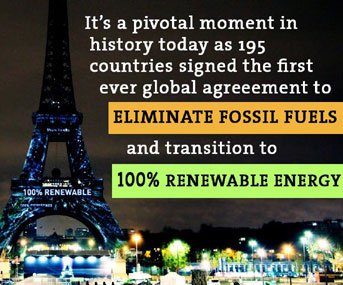by Rona Fried
"It always seems impossible, until it is done." Nelson Mandela
And it is done. There is no turning back – we have made history – on December 12, 2015 humans turned away from fossil fuels and toward this future: clean air and water, vibrant forests, streams and oceans for all creatures large and small that inhabit this earth.
We can also look forward to a worldwide economic boom as a new raft of industries take off and thrive, providing tens of millions of people with well-paying work they can be proud to do.

Paris Agreement
Like most agreements, the Paris Agreement isn’t perfect, but it’s a great step forward on the path we must take.
Important firsts:
1. We saw the business commmunity support a strong agreeement like never before and a strong signal has been sent to the rest of the corporate world: the era of reducing carbon and preference for clean energy has arrived.
2025 companies publicly submitted their own climate targets, for example.
This is the signal they have been waiting for – a level playing field that will spur banks and investors to shift their loan and stock portfolios from coal and oil to the growing industries of renewable energy. The same is true for utilities who will shift away from fossil fuels. And the field will open for entrepreneurs to make the breakthroughs we need.
Read our articles, 53 Companies Shoot For 100% Renewables, And 114 Set Science-Based Climate Targets;
Corporations Step Up For Climate, As Exxon is Exposed;
Billionaires, Governments Join To Spark Economic Revolution Based on Clean Energy
2. China, India and every country are part of the solution.
"Countries have been trying for years to craft an effective climate agreement. What made a difference this time was a groundswell from the front lines – mayors, governors, and CEOs who showed they’re taking the lead and pressed national governments to do more," says Bob Perciasepe, President of Center for Climate & Energy Solutions.
"Two forces drove Paris: the real and rising risks posed by climate change and the opportunities presented by a clean-energy transition. These forces will keep driving stronger action and investment and the Paris agreement will help ensure that all are doing their fair share," he says.

Details of Agreement
185 countries submitted climate plans – representing 97% of world population and 94% of greenhouse gas emissions.
- Goal: keep global temperature rise "well below 2°C (3.6°F) and for the first time, the ultimate goal is 1.5°C. Countries agree to peak greenhouse gas emissions as soon as possible.
- The goal is for the world to be carbon neutral by 2100, meaning that the only emissions will be those that can be naturally absorbed by earth’s carbon sinks – forests, wetlands and oceans.
The agreement explicitly calls for protection and restoration of forests and other ecosystems.
"This is not just about limiting temperature rise, but also maintaining the resilience and integrity of carbon sinks, such as the oceans and forests," says Johan Rockström of Stockholm Resilience Centre.Read our article, Pledges at COP21 Would Restore 482,000 Square Miles of Degraded Lands
- Includes all countries, rather dividing the world into developed and developing countries. It is bottom up – working off what each country commits to do, rather than prescribing actions top-down.
Advanced countries agree to take the lead, however, with economy-wide absolute emission reduction targets.
Read our articles, China & Africa’s Big Announcements at COP21;
120 Countries Sign Up for International Solar Alliance - Countries will submit new, more ambitious climate targets every 5 years, beginning in 2020. They will be published publically 9-12 months before being finalized so that they can be analyzed by all stakeholders.
- Each new target will be higher reflecting progress made and the most countries can achieve.
- Five Year Cycle for analysis of collective climate progress. Beginning in 2018, scientists will assess the results of global climate action to help inform further efforts.
- All countries must report on greenhouse gas emissions by source using a standardized process.
- $100 billion a year by 2020 to the Green Climate Fund will help the poorest, most vulnerable countries adapt and grow through low-carbon measures.
- While unanimously adopted in Paris, the agreement must be formally approved by at least 55 countries that account for at least 55% of global greenhouse gas emissions before it comes into force.
The Paris Agreement "establishes the enduring framework the world needs to solve the climate crisis. It creates the mechanism, the architecture, for us to continually tackle this problem in an effective way. It paves the way for each country to make more progress in successive stages over the coming years. It sets a powerful signal that the world is firmly committed to a low carbon future … and that has the potential to unleash investment and innovation in clean energy on a scale we haven’t seen before," says President Obama.
"This agreement represents the best chance we’ve had to save the one planet that we’ve got. I believe this moment can be a turning point for the world," he says.
In the Nick of Time?
2015 is set to be the warmest on record … by far, according to the US National Oceanic and Atmospheric Administration (NOAA).
If the world had only kept its promise to deal with climate change at 1992 Rio Conference, it would have been EASY to keep temperatures from rising more than 1.5°C. Now, we know it’s absolutely necessary, but almost out of reach. Meeting 2°C isn’t enough – large parts of the world will become less habitable.
We still desperately need a price on carbon and an end to fossil fuel subsidies – this is the only way emissions will come down fast enough, says climate scientist James Hansen.
